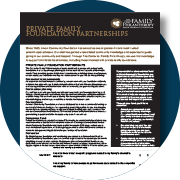When charity becomes a chore: private foundation alternatives
By Julie E. Firestone, Principal
Singerman, Mills, Desberg & Kauntz Co., L.P.A.

The Getty Foundation. The Bill and Melinda Gates Foundation. Private foundations formed by successful, entrepreneurial families, perhaps even initially operated by the entrepreneurs whose names they bear.
While organizations like these may have started out being run by volunteers or the family's back office, they have since grown to support their own paid staff. These are private charity successes. However, this is not the story for every private foundation. Sometimes, the business side of operating a stand-alone charitable organization has become too expensive or cumbersome. Perhaps what started out as charitable passion has become obligation. Or, one generation's dream of charitable entrepreneurship has become the next generation's corporate drudgery.
Private foundations enable charitable entrepreneurship, at a cost. Private foundations have been used successfully in complicated sales of closely held businesses or to unite families in charitable endeavors. However, private foundations require extensive care and feeding. They must maintain formal records of all financial activities, leadership activities and charitable activities. They must obtain formal IRS recognition, must file annual tax returns, and must have a formal leadership structure with liability for operational decision making. Some say that to justify the costs of its administration, a private foundation should hold a minimum of $10 million in assets.
Growing in availability, acceptance and popularity, donor-advised funds have become an effective and efficient alternative to the private foundation. A donor-advised fund is a component fund of an existing "sponsor" public charity under the Internal Revenue Code. Once established, the sponsoring organization handles the bookkeeping, management and corresponding expenses of operating the donor-advised fund. The degree of donor involvement allowed will vary depending on the sponsoring organization. Many, including Akron Community Foundation, allow donors to have grantmaking powers, to appoint individual advisors or committees with designated successors, and even to designate their own advisors to manage investments.
Did You Know?
Private foundations can also create a companion fund at Akron Community Foundation to tap into the services offered through The Center for Family Philanthropy. A donor-advised fund can be created using some or all of a private foundation's mandatory 5% payout. Once the fund is created, our experienced staff becomes your dedicated philanthropic team – consulting with you on grantmaking strategies, sharing pressing funding needs in the community, facilitating multigenerational family meetings, and more. Learn how we're uniquely positioned to partner with private family foundations.
When a private foundation's costs and burdens become too great, a donor-advised fund can be a handy escape hatch. The specific procedure to convert a private foundation to a donor-advised fund will vary depending on how the private foundation was formed (e.g., as a trust or as a business entity, such as a corporation or a Limited Liability Company).
Depending on the laws of the state governing it, a private foundation formed as a trust may require a judicial decree of termination, sometimes including approval by the state's attorney general, and must be terminated in accordance with the trust's governing instrument and statement of charitable purpose. A private foundation formed as a business entity must be dissolved in accordance with applicable state business law, as well as the terms of the charitable business's governing instrument. The amount of time and associated costs to complete either of these processes will vary depending on the jurisdiction.
Because private foundations have their own tax-exempt determination, their unwinding is also governed by the Internal Revenue Code. For example, it is critical that all of a private foundation's assets be transferred to the receiving donor-advised fund. To avoid liability, taxes or penalties, it is important that anyone wishing to convert a private foundation to a donor-advised fund consult with a knowledgeable attorney or accountant to ensure sure that all requirements for timing and record keeping of the conversion are met. Akron Community Foundation has also created a comprehensive Private Foundation Dissolution Checklist to streamline the process.
After careful review and consideration, converting to a donor-advised fund might be a solution for a private foundation whose costs and required corporate rigors outweigh its benefits. The experienced team at Akron Community Foundation is available to meet with you and your clients to discuss options for partnering with a private foundation.
For more information about the services Akron Community Foundation offers to private family foundations, contact Laura Lederer at 330-436-5611 or llederer@akroncf.org. We're always available to answer your questions about philanthropy or to schedule a personal consultation with you and your clients – all at no cost.
Additional Resources
This content is provided for informational purposes only. It is not intended as legal, accounting, or financial planning advice.


